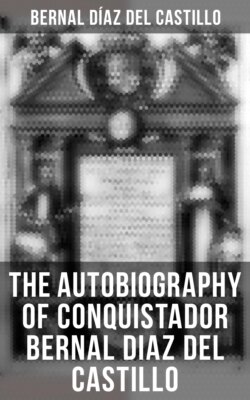Читать книгу The Autobiography of Conquistador Bernal Diaz del Castillo - Bernal Diaz del Castillo - Страница 50
На сайте Литреса книга снята с продажи.
CHAPTER XLIII.
ОглавлениеTable of Contents
How the partisans of Diego Velasquez would not acknowledge the power we had conferred upon Cortes, and what further took place.
The partisans of Diego Velasquez, finding we had elected Cortes captain-general, and appointed the other officers just mentioned, were terribly annoyed and vexed. They armed themselves in small troops, and threw out the most insolent language against Cortes and those among us who had chosen him captain-general. All this they considered should not have been done without the consent of the whole of the officers and soldiers. Diego Velasquez had merely empowered Cortes to barter with the natives. In short, their dissatisfaction rose to such a pitch, that our party was afraid matters would be carried much farther, and end in hostilities. Cortes now secretly desired Juan de Escalante to intimate that we should demand the instructions to be produced which he had received from Velasquez. This was accordingly done, and Cortes pulled them out from under his waistcoat, handing them over to the royal secretary to be read aloud. And sure enough the words were, After you have bartered for as many precious things as possible, you shall return home. This document was signed by Velasquez, and countersigned by his private secretary Andreas de Duero. Upon this we desired of Cortes that these instructions should be entered into the appointment we had given him, and announced by a public crier, as had been done at Cuba, in order that his majesty might convince himself of the true state of things, and that everything was done to further his sovereign interest only. This step was most agreeable to our purpose, as the bishop of Burgos, Don Juan Rodriguez de Fonseca, was wrongly informed respecting these proceedings, and only laboured to ruin us, as we subsequently learnt. The partisans of Diego Velasquez, however, were not to be silenced by this; and as the election had been made without their knowledge, they considered it illegal, and maintained that they were not called upon to obey his commands, but were determined to return to Cuba. Cortes answered, that he would not compel them to remain, but would discharge any one who might wish it, even if he himself should, in the end, remain alone behind. By this some were silenced. Juan Velasquez de Leon, (who was closely related to Velasquez,) Diego de Ordas, Escobar, (whom we commonly termed the page,) Pedro de Escudero, and others of Velasquez's party, still continued refractory, and things at last came to such a pass, that, in the end, they formally refused to obey Cortes. In such a state of affairs it was necessary to adopt some stronger measure, which was carried into execution with our consent. We seized the persons of the above-mentioned refractory officers, bound them in chains, and kept watch over them as if they had been prisoners.
Respecting these circumstances Gomara has again been misinformed, and not a word is to be credited of anything he says on the subject.
